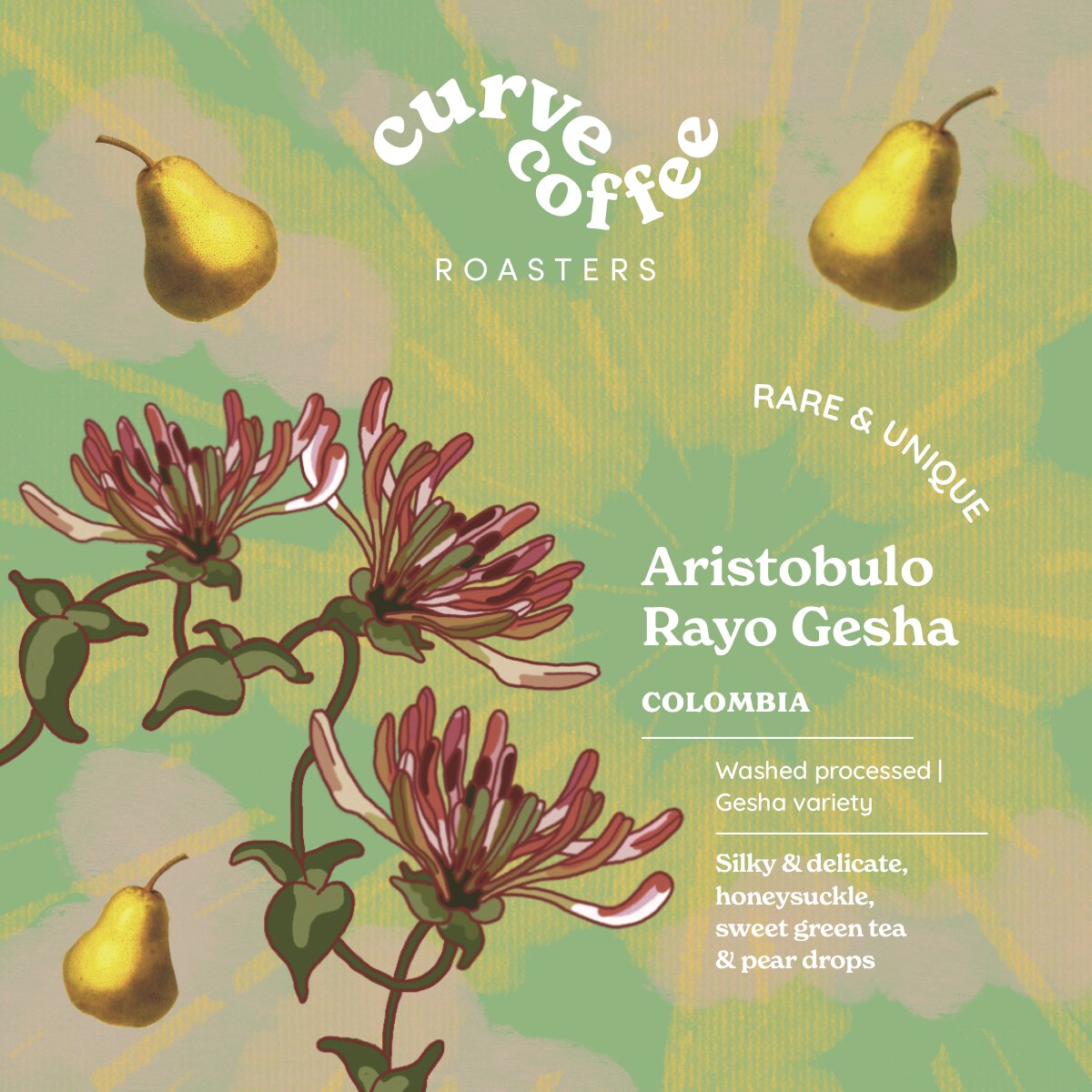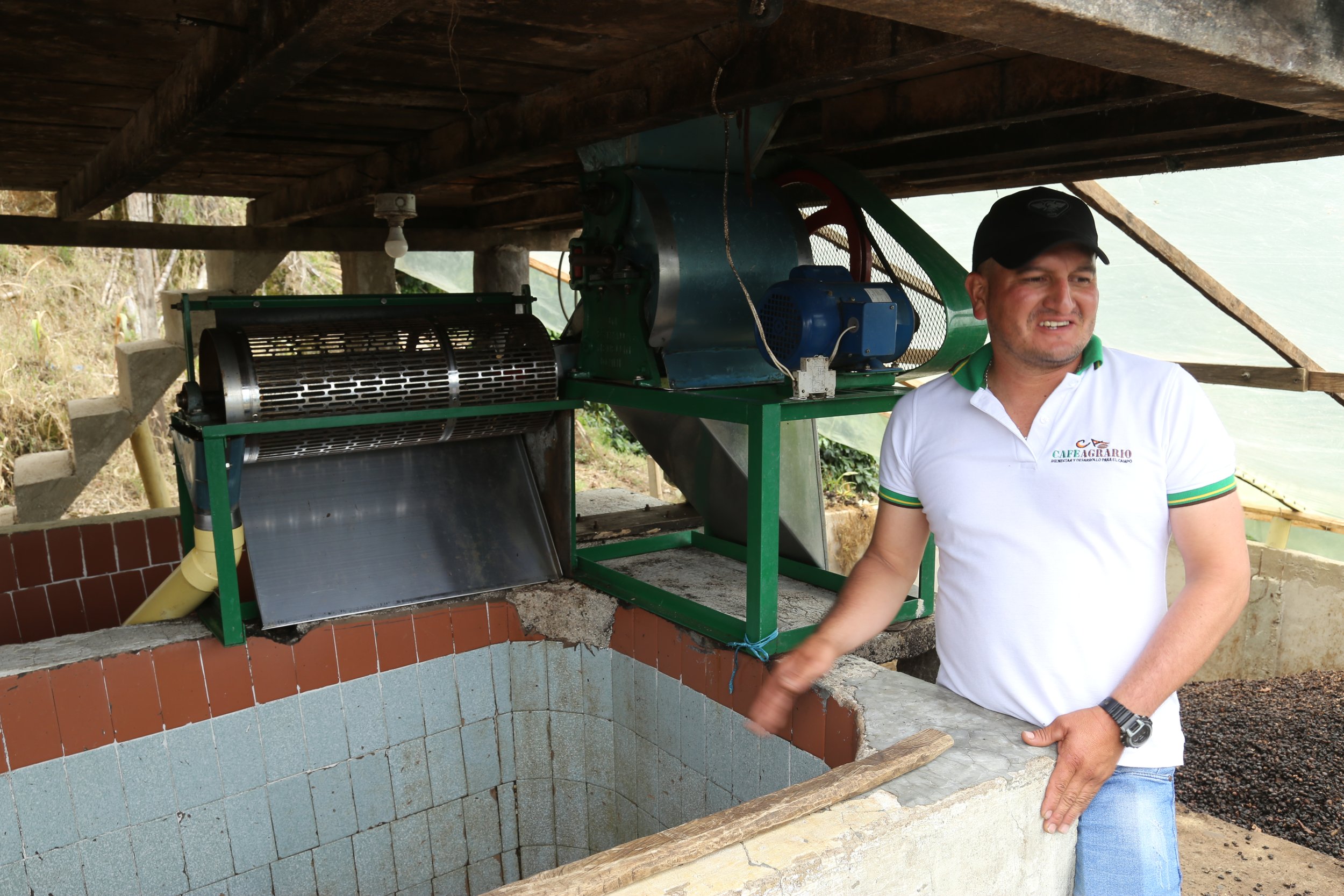Rare & Unique Series : Aristobulo Rayo | Gesha | Colombia
Key Origin Info:
Producer: Aristobulo & Alexander Rayo & family
Farm: La Victoria
Region: Ortega, Tolima
Altitude: Around 1600-1750 masl
Variety: Gesha
Process: Fully washed
Cup profile: Silky & delicate, honeysuckle, sweet green tea & pear drops
Exporter: Siruma | Importer: Falcon Coffees
Length of partnership: 1st time purchase 2024
Aristobulo & family at Siruma’s office.
More about the Rayo family and their farm:
Aristobulo and his wet mill
This outstanding coffee comes from Aristobulo Rayo’s farm La Victoria based in the lush landscapes of Tolima. Managed with the help of his son Alexander and support from Siruma exporters, they have turned their family coffee farm into a beacon of excellence, driven by passion and curiosity. Diversifying their coffee range they now produce lots for regional blends but also microlots and rare varieties such as this exquisite Gesha. The Spanish word ‘rayo’ translates to ‘ray’ which feels very reflective of the rays of hope and innovation emitting from the Rayo family’s farm.
As Siruma share:
Alexander Rayo
In the lush landscapes of Tolima, Colombia, Aristóbulo Rayo, 69, and his son, Alexander Rayo, 38, have turned their family coffee farm into a beacon of excellence, driven by passion and curiosity. For decades, Aristóbulo cultivated coffee using traditional methods, sticking to familiar varieties and often mixing them together. Occasionally, he'd plant seeds from a neighbour, never paying much attention to the distinct profiles of his beans.
This is where Alexander's journey begins. Eager to learn and innovate, Alexander started separating their coffee batches to explore their unique qualities. Despite this newfound curiosity, he continued selling their coffee in the nearest town, priced solely by weight. Lacking the skills to properly cup or roast, their potential remained untapped. Three years ago, everything changed. Siruma expanded its reach to the lesser-known yet promising areas of Tolima. It was here that we encountered Aristóbulo and his family, and had the opportunity to hear their story and taste their coffee. The experience was nothing short of a revelation. The potential of their coffee was astonishing, yet there was ample room for improvement. With determination and guidance, we embarked on a journey of transformation. Through numerous workshops and meticulous adjustments to their soil, processing, and drying techniques, the Rayo family's coffee began to shine. Today, they have developed distinct and replicable profiles for various coffee varieties, some achieving scores rarely seen in Colombia.
Alexander's curiosity has opened new doors for their farm, enabling them to diversify the range of coffees they produce to include lots for regional blends but also micro-lots and very rare coffees, such as this Gesha, that command significantly higher prices. Their story is a testament to the power of curiosity, support, and hard work. Together, we now have the opportunity to showcase their outstanding coffee to the world, while simultaneously enhancing their livelihood and prosperity. The story of Aristóbulo and Alexander Rayo is a true inspiration, proving that with passion and perseverance, remarkable transformations are possible.
About Cafe Agrario association:
Aristobulo is a member of Cafe Agrario - an association of growers from Ortega.
The Rayo family’s drying area
As Siruma explain:
This association was initially set up with a political purpose and had a leader with roots in the guerrilla conflict that Tolima was known for in previous years. As such, the association didn’t have any intentions to look for commercial activities or seek help from the government or other entities that work to help growers improve coffee yields and/or quality. Initially this did not pose any problems for its members, but as time passed by and more associations started to form in the region Cafe Agrario’s member understood such associations were built to benefit their members by assessing these kinds of help.
After 6 years Cafe Agrario changed its leader and its course and started to receive help from NGOs and other entities. The progress of the association and the coffee growers regarding quality and quantity was huge. As a consequence, the leader sought to increase sales exponentially and started to sell the members’ coffee on credit. Unfortunately, sales were made to companies that were were insolvent and couldn’t make their payments which resulted in the coffee growers’ not receiving their payments for coffee they had delivered.
Even though all the 35 families that are part of this association suffered hardship as a consequences of these failed sales, the growers continued to produce coffee - striving to find new ways to add value to their product. They have pivoted to specialty coffee, looking to increase their income by producing better quality coffee. And though there is certainly potential for high quality production, there is need to improve knowledge and knowhow of the processes needed to produce coffee exportable within the speciality market. And this is where Siruma can help. Not only by providing support through their sustainability and agronomy team but also by purchasing their coffee and being their direct link to the said quality focused market.
The association has now been working with Siruma for 2.5 years and their progress has been significant, where both the coffee quality and the logistical and organisational skills of the group have seen incredible development. Furthermore, the association’s insufficient infrastructure and knowledge on quality analysis of their coffees meant that they weren’t fully aware of the value of their product and accepted base prices from their buyers even though when appropriately assessed their coffee had the potential to benefit from a much higher price within the marketplace. With Siruma's help they now have the capacity to do the proper physical analysis of their coffee and now know the different varieties their farms have in order to process separately and sell sought after single variety lots.





